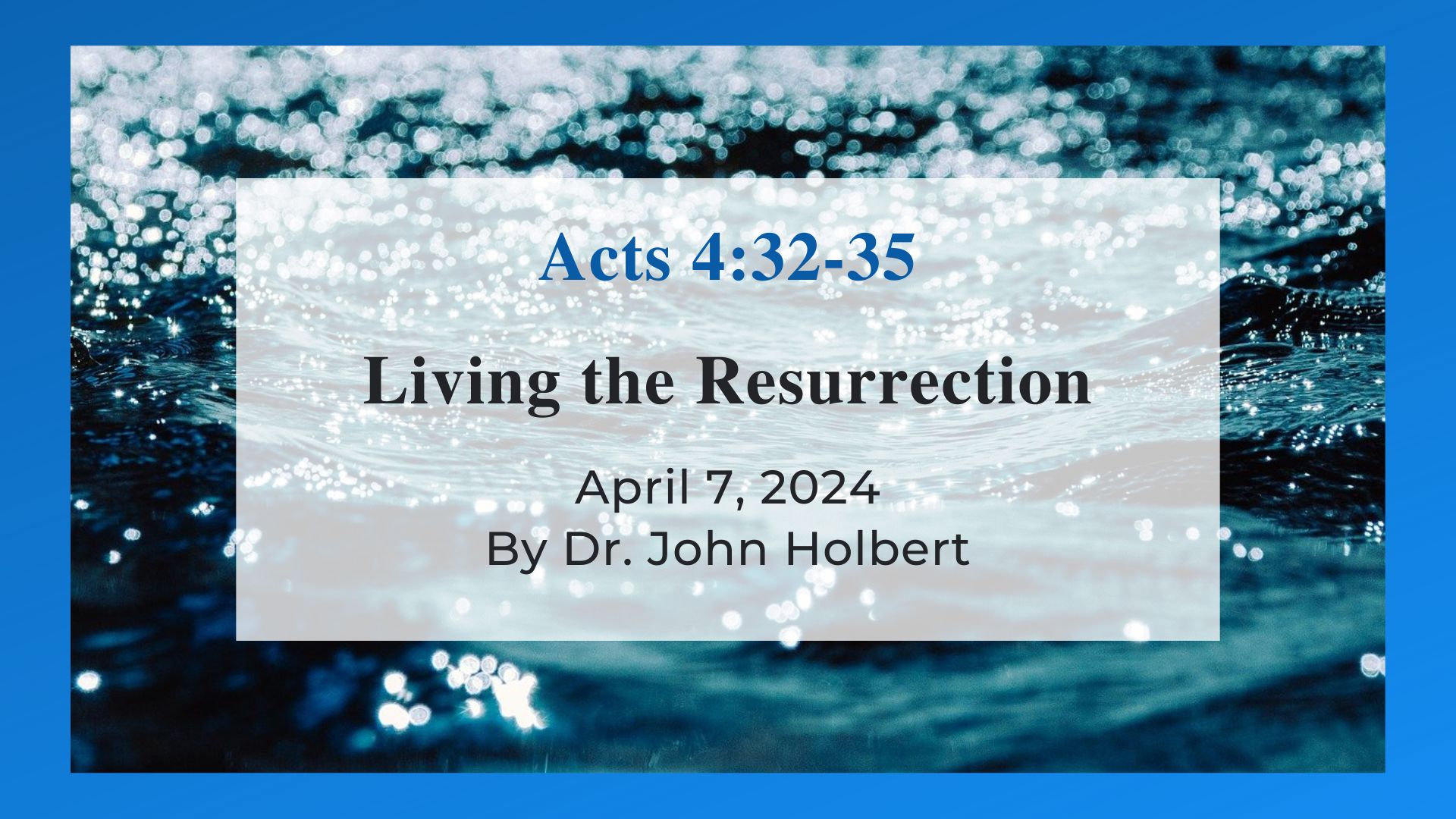Living the Resurrection - Reflections on Acts 4:32-35
by Dr. John Holbert on Tuesday, April 2, 2024

Living the Resurrection
Acts 4:32-35
The Peripatetic Hebrew Bible Preacher
As is the lectionary’s custom, the six Sundays after Easter until Pentecost, use lections from the Acts of the Apostles in place of texts from the Hebrew Bible. That reality has often caused me—a deep lover of the Hebrew Bible—some concern, fearing that the substitution might add to the dangerous notion that the First Testament might be extraneous in light of the resurrection of Jesus. Clearly, enough foolish reflections on that absurd idea have long been abroad in the Christian land. However, I am more than glad to say that this text from Acts that immediately is assigned for the first Sunday after Easter is a crucial text that recalls quite directly important insights from the Hebrew Bible. Hence, far from substituting for it, the author of Acts, Luke, the writer of the Gospel that bears his name, has amplified the call of the older testament to order the new resurrection community in the way that the Israelites were similarly called to shape their community under YHWH.
That connection is made explicit in Acts 4:34, but the context of that verse is important before we look more closely at that single verse. That context is justly famous—or infamous, depending on one’s economic stance. “Everything they owned was held in common,” because “they were of one heart and soul, and no one claimed private ownership of any possessions” (Acts 4:32). Such an idea flies directly in the face of unfettered capitalism, the most sacred of sacred cows in the modern USA. One of our two largest political parties, the Republican Party, has made an unregulated free market the very stuff of its economic beliefs. Nor among the other party, the Democrats, would one find many who would disagree, save a few Bernie Sanders disciples, whose voices seem rather stilled in 2024. Still, whether one reads this verse in Greek, English, or any other translation available, it is difficult if not finally impossible to conclude that this verse does not in any way affirm unfettered capitalism as the proper way to order the economy of the resurrection community.
And we should further note that the very next verse of the text implies that this economy of goods held in common added directly to the power of the gospel they have been called to proclaim: “The apostles were bearing witness to the resurrection of the Lord Jesus with great power. And great favor was on all of them” (Acts 4:33). There is here a clear connection between authority and shared possessions; because the apostles hold all things in common, they can preach about the resurrection “with great power.” That connection suggests that when goods are not held in common the power of the preaching is diminished. Communities that contain persons who have great wealth in a land where there remains great poverty and great need blunt the force of the resurrection proclamation.
And that brings us to vs.34. “There was not a needy person among them, for as many as owned lands or houses sold them and brought the proceeds of what was sold” (NRSV). The use of the word “needy” (endees in Greek) makes the verse an allusion to Deut.15:4, as found in the Septuagint: “When YHWH God blesses you in your land, there will be no needy person among you.” And the next verse offers the condition for YHWH’s blessing, namely “when you obey the voice of YHWH your God to keep all these commandments that I have commanded you this day.” Deut.15:1-18 discusses the sharing of possessions. In short, the resurrection community of Acts has heard the voice of the prophet, Moses, has shared its possessions and is now enjoying the blessings promised by God to those who share, including the great power proclamation of the resurrection of Jesus.
Of course, Luke is no fool; he knows full well that there remain needy in the land, despite the call of God to share all with them. The fact that the needy remain makes it plain that the call to share is not yet heard by all who are would-be followers of the resurrected one. And the same thing may certainly be said of us, we 21st-century would-be followers. The fact that the needy remain in their untold millions in our world is a stark testimony that the sharing of all we have has not yet occurred, despite the call of our God. And the fact that even in Luke’s community the sharing of all for all has not happened is made all too plain by the terrible story of Ananias and Sapphira in Acts 5, who because they refuse to share all they have, both die at the feet of Peter.
It has been said that the force of the proclamation of the gospel is necessarily blunted by any preacher who arrives at a grand church in a Bentley automobile, having left a spacious mansion that morning, wearing a $5000 designer dress. It is telling that the very first Sunday after Easter warns us to look to our economic status before we attempt to preach the gospel; the former will without doubt determine the power, or lack thereof, of the latter.
